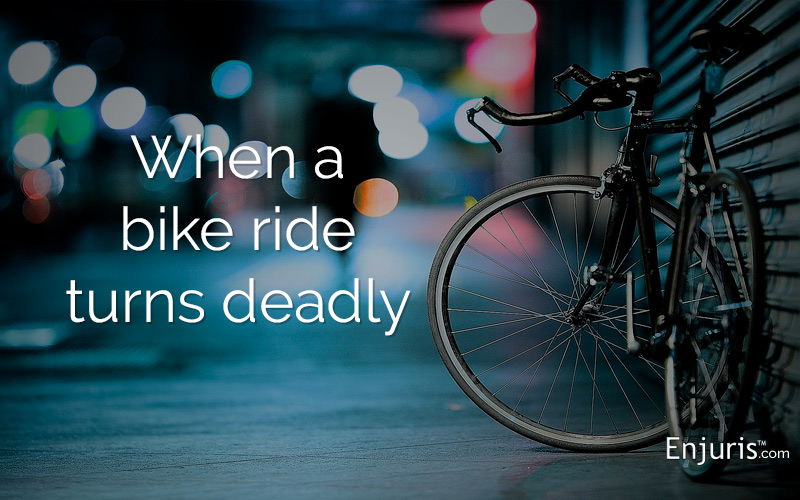Learn how damages are calculated in personal injury lawsuits for cycling accidents
Whether you use a bicycle as means of transportation or you ride a bike for fitness and leisure, Georgia’s mild weather and beautiful scenery make bicycling a particularly enjoyable hobby for many residents and tourists. Unfortunately, cycling isn’t without its risks.
According to the CDC, there were nearly 467,000 bicycle-related injuries in the US and 1,000 deaths in 2015. Even with helmet use and other protective gear, the damages connected to bike accidents costs approximately $10 billion in medical bills and productivity losses each year.
Many cycling accidents are caused by negligent drivers who can be held liable for your injuries. If you or a loved one was injured in a bicycle accident, a personal injury lawsuit may be the best option to pursue to recover financial compensation.
Causes of bicycle accidents when the rider is at fault
Georgia is a modified comparative fault state, meaning a bicyclist must be less than 50% at fault for their accident in order to recover damages. Below are some cycling accident statistics:
- 19% of accidents occur when a biker ignores a stop sign, yield sign or red light
- 15% of accidents are caused when a bicyclist rides against traffic
- 10% of accidents occur because a bike rider failed to yield to ongoing traffic before entering the roadway.
- 10% of accidents are caused by inadequate lighting/reflectors on the bicycle
It’s important to remember that bicycles are considered motor vehicles by law. A cyclist must follow the standard rules regarding driving and highway use. Thus, a bicyclist can be found at fault if they:
- Failed to signal before a turn
- Failed to indicate a significant speed increase or decrease
- Rode under the influence of drugs or alcohol
- Rode without caution in hazardous weather conditions
- Rode without caution in dangerous road conditions
If you were in an accident and operated your bicycle in any manner that could place you at fault, don’t assume you are ineligible for a personal injury lawsuit. Any of the above actions may result in a judge or jury panel assigning you a percentage at fault. For example, riding too fast in the rain could put your fault level at 30%. As long as you are less than 50% at fault, you are still be eligible to recover damages.
Don’t try to calculate your percentage of fault on your own. A consultation with a personal injury attorney is the best option when trying to decide if you should pursue a lawsuit following your Georgia bicycle accident.
Georgia bicycle use laws
Like any other state, Georgia expects bicyclists to follow the same rules and regulation as any other motor vehicle. Specific laws for bicycle use, however, are outlined in §40-6 of the Georgia Code. Important laws to remember are:
- Bicycle riders must ride in the same direction as traffic, even if there is a designated bicycle lane.
- Bicyclists must travel as close to the right side of the road as possible, unless avoiding a hazardous road condition.
- Anyone 16 or older must be wearing a helmet or risk facing punishment. Under the age of 16, parents are held liable for their children’s helmet use.
- It is illegal for anyone over the age of 12 to ride along the sidewalk.
- Bike riders must not lane share with more than one other side-by-side bicyclist.
- Only one passenger per bicycle, unless the bicycle was specifically designed to carry more than one person.
- Because at least one hand must be on the handlebars at all times, it’s illegal to carry or transport any item that prevents proper hand positioning.
- All bicycles must have proper brakes installed that allows the bike to skid on dry pavement.
- Bicycles must have a white light on the front that allows for visibility up to 300 feet ahead.
- All bicycles must have either a rear red reflector or light to allow for visibility up to 300 feet away.
As with any other traffic offense, violation of Georgia’s bicycle laws may result in a traffic citation and could limit your recovery in a personal injury case.
Bicycle accidents with negligent drivers
Most personal injury cases for bicycle accidents are negligence claims. Here, four criteria must be present in order for you be awarded damages. These criteria are:
1. The driver owed you a duty. This will automatically be satisfied as all motor vehicles owe each other a duty to share the road responsibly.
2. The driver breached that duty. This is satisfied by proving that the driver did anything that a reasonable driver wouldn’t have done. Texting while driving is an example of this.
3. The breach of the driver’s duty caused your accident. In short, the criteria is satisfied if the driver’s actions were the direct cause of the accident. Following the above example, if the driver wasn’t texting, they would have seen you on your bicycle and slowed down. Thus, their actions put them at fault.
4. You sustained injuries as a result of the driver’s actions. This criteria is also met easily as you are likely suing the driver to recover compensation for medical bills and lost wages.
Potential compensation for bicycle accidents
Accident survivors could recover some or all of the following damages in a personal injury lawsuit. Compensation includes:
- Medical expenses - Emergency room visits, ambulance rides, medication costs, etc.
- Interference with everyday life - These damages provide compensation when the accident stopped you from participating in and enjoying the activities that used to be part of your daily life.
- Lost earnings - As many bicycle accidents cause serious injuries, accident survivors may have needed to take time off from work. Even if you used sick leave or personal time, you can still recover these lost wages as damages.
- Loss of earning capacity - If the bicycle accident left you with a permanent physical handicap or other serious injury, you may recover damages to cover the lost potential income. These damages are possible even if you were unemployed at the time of the accident.
- Pain and suffering - These are a broad range of damages that assist with the physical and emotional harm you received from the accident including long-term care.
- Property damage - Damage to your bicycle or other possessions.
- Punitive damages - Though rarely awarded, a defendant may be forced to be pay punitive damages according to §51-12-5.1 of the Georgia Code.
Though accident victims have the potential to receive all of the above damages, each case is different. The strength of your claim and the expertise of your attorney impact your compensation greatly.
Read our guide on how to pick the best attorney for you and then browse our directory of Georgia attorneys to get your case started on the right foot.
See our guide Choosing a personal injury attorney.


